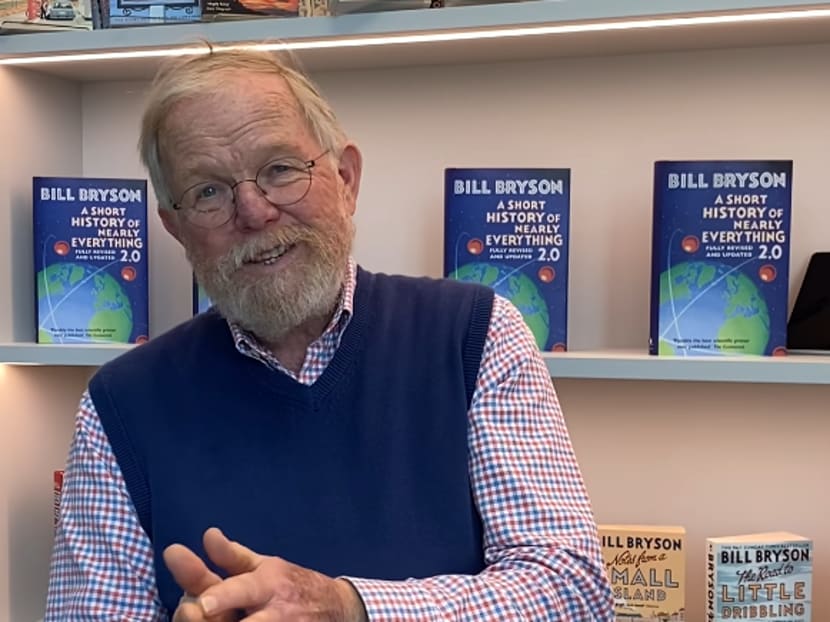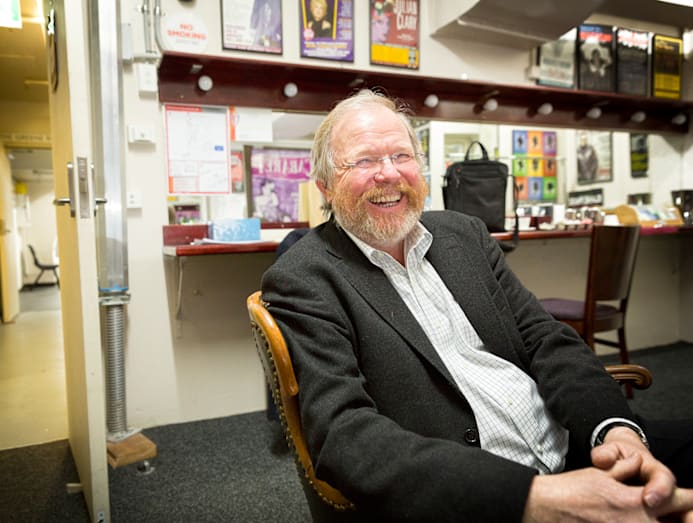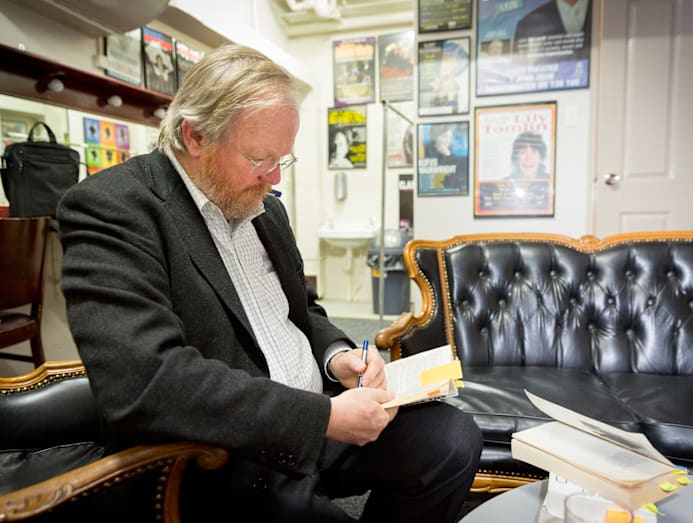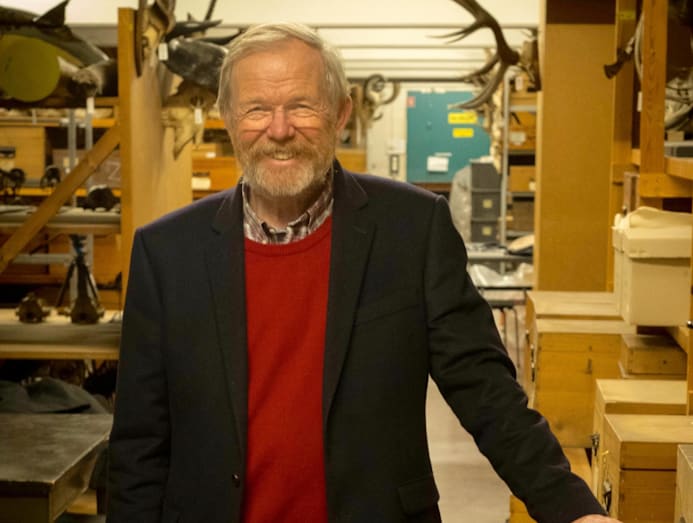Bestselling author Bill Bryson on staying curious at 74, being a generalist and his upcoming shows in Singapore
CNA Lifestyle caught up with American author Bill Bryson, whose live performances in Singapore on Feb 4 and 5 are part of his tour for his latest book A Short History Of Nearly Everything 2.0 – a fully updated version of his popular science classic.

American author Bill Bryson has published A Short History Of Nearly Everything 2.0, an updated version of its 2003 title that's widely considered the 21st century's bestselling popular science book. (Photo: Facebook/Bill Bryson Author)

This audio is generated by an AI tool.
“There is nothing in the world that isn’t fascinating if you take the time to just examine it,” renowned American-British journalist and author Bill Bryson reminds me towards the end of our 15-minute video call.
I know immediately the man isn't being glib. He's made a living – and a name for himself – from chasing his curiosity.
Bryson is perhaps most known for his 2003 title, A Short History Of Nearly Everything, widely considered the 21st century's bestselling popular science book.
As its name would suggest, the book is arranged in self-contained chapters, each focused on a major scientific field or discipline, from the birth of the universe to the makeup of atoms.
What makes it stand out, as compared with other books in the genre, is ostensibly his conversational writing style, paired with an undertone of awe that’s even more endearing when many would expect a person his age to feel jaded about the world.
At 74 (though surely at least half a century younger in spirit), he clearly has no intention of slowing down.
Bryson's latest title, A Short History Of Nearly Everything 2.0, was released on Oct 21. The fully revised and updated version reflects on the scientific discoveries made in the last two decades like why Pluto lost its planetary status.
Old and new readers can, of course, expect his usual wit. And not just in print.
He will stage two shows in Singapore on Feb 4 and 5 at Capitol Theatre as part of his book tour. These theatrical performances are based on content from his newest title, including stories of the scientists behind the discoveries and their sometimes eccentric behaviours.
Many have said his public speaking mirrors his wry observations on the page. So if there were a failproof formula to remaining endlessly curious about life, one would assume it lies with him.
ON STAYING CURIOUS
Earlier in our chat, I asked Bryson, rather despairingly, for his secret to cultivating curiosity in an era of convenience.
With artificial intelligence (AI) able to feed us answers to virtually anything and everything within mere seconds these days, whether those answers are accurate seems to matter little.
What does matter is the ease and speed that AI satiates our questioning, stripping away the very friction that normally prods us to look harder, dig deeper and keep asking why.
And this tension, I posited, is not only beneficial for curiosity. It's necessary.
Bryson appeared to be stumped, before admitting he doesn't quite have a solution either. But who can blame him? The existential conundrum may not have occurred to a man whose own curiosity has never waned.
He is undeniably enchanted by all of life, all the time. Even the mundane act of sitting in a cafe, studying food packaging labels and wondering how bottled soya sauce or ketchup is made, can be “quite interesting”, he quipped.

In fact, walking is his favourite way to experience the world. It forces him to notice everything that the convenience and efficiency of driving or cycling, for example, would blur.
You can expect him to hit the streets when he lands in Singapore next year, to catch up on all he missed during his first visit. The country’s “nice, big sidewalks” – and the Botanic Gardens, which was apparently love at first sight – won him over during a 24-hour layover in 2019 when he and his wife were en route to Australia.
Even (or perhaps especially) in a new city, he likes heading out on foot with minimal preparation. Few things excite him more than arriving at a junction, not knowing beforehand which direction to head.
“I like to be ignorant about (a city) when I first get there. I don’t like to be too well-prepared because I love that sense of stumbling across something,” he said. “It feels like a wonderful sense of discovery, as if you’re the first person to see this thing.”
But, he’s quick to add, these walks have to be distraction-free.
“Everybody’s listening to music all the time now, wherever they go in the world and they miss out on hearing birds and life all around them. I think that’s a great shame. We should experience the whole of everything in three dimensions all the time,” he said.

PERKS OF BEING A GENERALIST
Many would argue it’s impossible to teach curiosity, but what Bryson is hoping to nurture seems to be a sensibility less innate. It’s the power of noticing, both the external and one’s inner world – a thread that runs through his work.
His most notable, A Short History Of Nearly Everything, asks not just what we know but how we know it. Essentially, being curious about curiosity.
“How does anyone work out how much the Earth weighs? I think even scientists often forget about the amazement and wonder of it all,” he said.
“Just the very fact that we exist, that all of these atoms and molecules inside you are working in this coordinated fashion to allow you and me to sit here right now … that’s something almost everybody takes for granted. But your existence is an absolute miracle.”

Unsurprisingly, Bryson embraces being a generalist – his lack of specialisation both a cause and an effect of his wide-eyed wonder.
“When I was more active as a journalist, I used to go from one assignment to another. It was always about things I didn’t know anything about until I started doing it. And there’s a real advantage in that sometimes,” he said.
“If you come to a (topic) fresh and you don’t know anything about it, you have this sort of infinite capacity to be amazed by what you’re learning, whereas if it’s something you know an awful lot about, sometimes you get blase about it and start to take wonderful facts for granted.”
His disinterest in sticking to a lane also allows him to better appreciate those who do.
"(A Short History Of Nearly Everything) is a book trying to give people a general appreciation for what these scientists do for us. I could not write a textbook on science – even if I spent 10 years studying the field, I wouldn’t have the patience or aptitude to do it. I am hopelessly a generalist,” he said.
“I’m glad that there are people who want to be geologists and cosmologists and bacteriologists and all that. We need those people, but that’s not me.”

Still, as jacks of all trades go, he is one hell of a master. He has sold more than 15 million copies from over 20 non-fiction titles on varying topics – including travel (Notes From A Small Island), the human body (The Body: A Guide For Occupants) and the English language (The Mother Tongue: English And How It Got That Way).
And they each showcase his knack for making knotty subjects a joy to read – skills he honed precisely because science once felt anything but fun.
HUMOUR AS WORLDVIEW
Growing up in Des Moines, Iowa, in the 1950s, Bryson was bored by how science was taught in the American education system. Equations and formulas on a blackboard “didn’t capture any excitement” of science, he said.
“All the time, I thought there’s got to be some way where people like me, who are never going to be scientists professionally, can engage with science. Because it obviously tells us everything there is to know – who we are, where we come from, where we’re going.”
A Short History Of Nearly Everything was hence always meant as a book for people to enjoy, not “a textbook”. And its humour was an effective, if possibly tricky, method to convey his own sense of wonder about the world.
“The book is trying to be factual and reliable ... but you can still sort of be wry about things. There’s an awful lot of life that’s absurd and miraculous,” he said.
In fact, the “amazingly dispiriting” state of the world today can make humour feel more essential than ever, he noted – not as denial, but as a way to stay present and make heavy issues “a little more bearable” to face.
After all, Bryson himself never turns away from what keeps us human. And his curiosity, more unquenchable than most, isn't satisfied with simply looking – it insists we see.
The Best Of Bill Bryson - Live On Stage will show at Capitol Theatre on Feb 4 and 5. Tickets can be purchased here.






